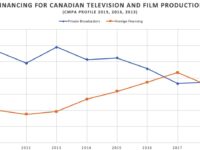Canadian Heritage Minister Steven Guilbeault is set to introduce his “Get Money from Web Giants” Internet regulation bill on Monday (update: the bill is on the notice paper, but may be delayed until Tuesday). Based on his previous public comments, the bill is expected to grant the CRTC extensive new powers to regulate Internet-based video streaming services. In particular, expect the government to mandate payments to support Canadian content production for the streaming services and establish new “discoverability” requirements that will require online services to override user preferences by promoting Canadian content. The government is likely to issue a policy direction to the CRTC that identifies its specific priorities, but the much-discussed link licensing requirement for social media companies that Guilbeault has supported will not be part of this legislative package.
Post Tagged with: "crtc"
Forget Link Licensing and Cross-Subsidies: When it Comes to Tech, Canada Should be Focused on Competition Law and Tax Policy
Canadian Heritage Minister Steven Guilbeault was recently asked about his plans to mandate licensing of links to news articles on social-media sites such as Facebook. While the policy is often referred to as a link tax, Mr. Guilbeault insisted that it was not a tax, stating “some people think every time the government acts, it’s a tax. What I’m working on has nothing to do with tax.” Instead of a government tax scheme, Mr. Guilbeault explained that he intends to have the Copyright Board of Canada set a fee for the links to articles, backed by government power to levy fines for non-payment.
Leaving aside the semantic debate over what constitutes a government tax, my Globe and Mail op-ed argues that the comments are notable because when it comes to addressing the concerns associated with the large technology companies, Canada should be working on taxation. Mr. Guilbeault has said his top legislative priority is to “get money from web giants,” yet rather than focusing on conventional tax policy, his preference is to entrench cross-subsidy programs that keep the money out of general tax revenues and instead allow for direct support to pet projects and favoured sectors.
The Guilbeault Internet Plan: Leave it to the CRTC and Copyright Board of Canada to Get Money from Web Giants
In recent months, Canadian Heritage Minister Steven Guilbeault has emerged as the de facto digital policy lead minister in Canada with Navdeep Bains largely silent on the race to regulate everything from online linking to how Canadian content is promoted on digital streaming services. New legislation is still forthcoming, but recent comments to industry town halls and press reports provide a good sense of what Guilbeault has in mind. In short, it appears the government will establish an extensive regulatory structure for digital services with registration or licensing requirements and mandated payments for a host of online activities. The amounts payable will be established through hearings at the CRTC and the Copyright Board of Canada. The government would retain the power to fine companies that fail to comply with the payment requirements and use a policy direction to the CRTC to make its policy intentions clear.
Guilbeault’s Bogus Billion Dollar Claim: What the Data Actually Says About Canadian Film and TV Production
Canadian Heritage Minister Steven Guilbeault has said that his top legislative priority is to “get money from web giants.” While much of the attention has focused on his ill-advised plan to require Facebook to obtain licences for linking to news articles, his first legislative step is likely to target Internet streamers such as Netflix, Amazon and Disney with new requirements to fund Canadian content and to increase its “discoverability” by making it more prominent for subscribers. Based on his comments at several town halls, Guilbeault is likely to also create new incentives for supporting indigenous and persons of colour in the sector with a bonus for those investments (potentially treating $1 of investment as $1.50 for the purposes of meeting Cancon spending requirements). Much of the actual implementation will fall to the CRTC, which will be granted significant new regulatory powers and targeted with a policy direction.
An Anti-Digital Agenda: Forget the Digital Policy Reboot, the Government Just Hit Delete Instead
Last week, I wrote about the need for the Canadian government to reboot its digital agenda, arguing that less than 12 months after the 2019 national election, the policy agenda had gone off the rails with a reversal on affordable telecom services, delays in broadband support and privacy reform, as well as plans for extensive online regulation. The Speech from the Throne, which sets out the government’s agenda, suggests that rather than rebooting the digital agenda, the government has largely deleted it altogether.
The speech was the longest throne speech since the Liberal election in 2015, yet there was apparently no time to reference privacy reform, intellectual property, wireless, or innovation (innovative appears once). Instead, beyond catching up on unfulfilled promises on rural broadband and promising action on online hate, the government’s digital agenda is – as Canadian Heritage Minister Steven Guilbeault said last week – now distilled primarily down to “get money from web giants.” That isn’t a digital agenda, it’s anti-digital agenda, with technology companies cast as both a foreign enemy to be regulated and an ATM for free cash to fund pet projects in the cultural sector.











